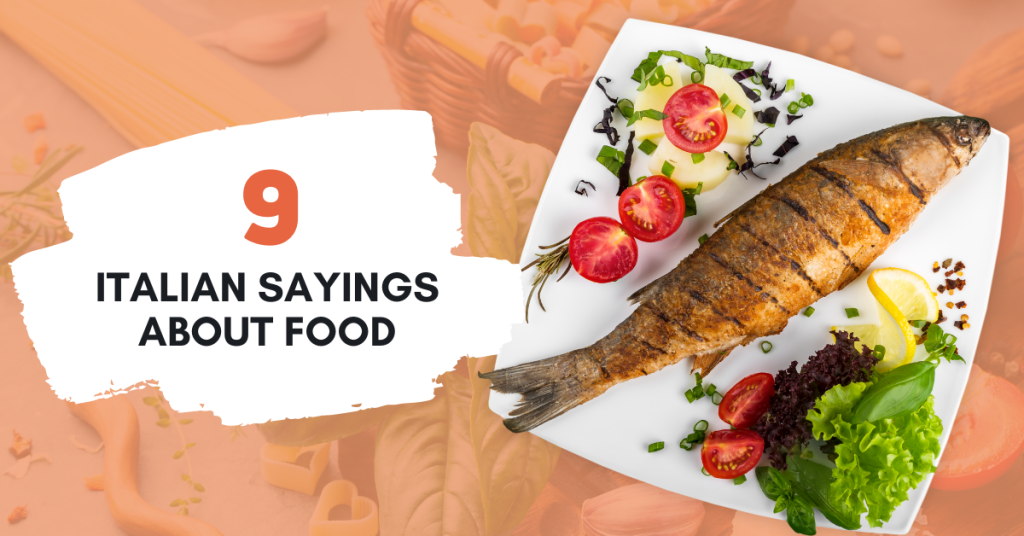Italy is known for its simple yet exquisite cuisine, along with its beautiful coastlines, warm locals and rich culture. Food is at the heart of Italian culture, so it’s not surprising that there are so many Italian sayings about food.
If you’re learning Italian, knowing how to describe food and express your love for it will help you sound more like a native.
Let’s look at some of the most famous Italian expressions about food.
Famous Italian Sayings About Food
1. Buono
What Does “buono” Mean?
“Buono” is arguably one of the most famous Italian sayings about food, and it’s a word that everyone should have in their Italian vocabulary.
When it comes to food, buono means tasty.
Per esempio: Questa pizza è buona! = This pizza is so good!
Because “buono” is an adjective, it must agree with the noun’s gender and number. In the example above, pizza is feminine, so we would use the feminine ending, which is “a.”
If it were multiple pizzas, we would say, “queste pizze sono buone.”
For masculine nouns, you would use “buono” for singular and “bouni” for plural.
If you want to say that a food is really, really good, then you could add the “issimo” ending. Questa pizza è buonissima!
2. Ottimo
What Does “ottimo” Mean?
The word “ottimo” is another way of saying food is really tasty. It’s a bit more enthusiastic than buono.
Per esempio: Questa pizza è ottimo! = This pizza is excellent!
3. Squisito
What Does “Squisito” Mean?
If you want to say that the food is exquisite or divine, then you could use the word “squisito.” Like “buono,” “squisito” is declined according to the noun’s gender and number.
Per esempio: La pizza erano squisita! = The pizza was exquisite!
If we were talking about multiple pizzas, we would say, “Le pizze erano squisite.”
For masculine nouns, you would use “squisito” for singular and “squisiti” for plural.
4. Gustoso
What Does “Gustoso” Mean?
If a dish is full of flavor or tasty, you could describe it as “gustoso.” Just like “buono” or “squisito,” “gustoso” is used as an adjective and should agree with the noun’s gender and number.
Per esempio: È un piatto molto gustoso. = It is a very tasty dish!
If it were multiple dishes, you would use “gustosi.”
For feminine nouns, you would use “gustosa” for singular and “gustose” for plural.
5. Fa venire l’acquolina in bocca
What Does “Fa venire l’acquolina in bocca” Mean?
If you’re talking to a friend about tasty food or you’re sitting down at a table full of delicious dishes, you may say, “fa venire l’acquolina in bocca,” or your mouth is watering.
Per esempio: Questa insalata pere mi fa venire l’acquolina in bocca. = This pear salad makes my mouth water.
What is the Literal Translation?
It’s mouthwatering!
- Fa = It makes
- Venire = come
- L’acquolina = water
- In bocca = in the mouth
The word-for-word translation sounds silly in English, but the expression simply means that something is mouth-watering or makes you hungry.
“È così buono che mi fa venire l’acquolina in bocca”#Gauss passione melone seconda parte ( per buona pace del mio pavimento appena pulito) pic.twitter.com/yfr7MX5rcj
— Vitadabionda (@facciobiondate) August 9, 2022
6. Uno tira l’altro
What Does “Uno tira l’altro” Mean?
Some foods are so good that you can’t just eat one. When you want to say that a food is addictive, you could use the expression: “uno tira l’altro.”
Per esempio: Buonissimi e uno tira l’altro! = Delicious and one leads to another!
This expression is the perfect way to describe cookies or chocolate – where one is never enough.
What is the Literal Translation?
One pulls the other.
7. Buon appetito!
What Does “Buon appetito” Mean?
English speakers are likely familiar with the French equivalent of this expression: bon appétit. “Buon appetito” simply means “enjoy your meal” in Italian.
It’s an expression that you’ll often hear in restaurants, but if you’re sharing a meal with family or friends, it may also be used to let everyone know that it’s okay to start eating.
Per esempio: Ecco la sua pizza. Buon appetito! = Here is your pizza. Enjoy your meal!
What is the Literal Translation?
Good appetite!
8. Posso assaggiare?
What Does “Posso assaggiare” Mean?
When you’re at a restaurant and a friend orders a delicious dish, you may ask, “Posso assagiare?” or “can I have a taste?”
Per esempio: Posso assaggiare il tuo gelato? = Can I have a taste of your ice cream?
Word of advice: know your audience! Not everyone wants to share their food.
9. Mangiamo!
What Does “Mangiamo” Mean?
Here’s a word that you’ll hear a lot in Italy. Mangiamo means “let’s eat!” It is the first-person plural conjugation of the verb mangiare, which means “to eat.”
Per esempio: Mangiamo! Sto morendo di fame! Or, in English: Let’s eat! I’m dying of hunger!
Final Thoughts
Now that you know some of the most popular Italian sayings about food, it’s time to put your new skills to the test. Practice using these words and phrases at mealtimes to express your joy and love of food.
Buon Appetito!

